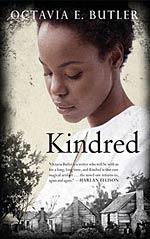
![]() spectru
spectru
12/31/2014
![]()
Octavia Butler's Kindred is about a modern black woman, Dana, being drawn back through time to Maryland in the early 19th century where she is enslaved. She is pulled there from her home in California whenever Rufus Weylin, white son of a slaveholder, is in mortal danger. She returns to her home when she fears for her own life. Her disappearances occur over a period of less than a month and each lasts a few minutes or hours. Her times in the past last for weeks or months. On the Weylin plantation, though, several years pass between each of her visits. When she first saves Rufus from drowning, he as about five years old. On her final visit he is in his mid-twenties.
Kindred is classified as science fiction because of the time traveling, but really that is just a literary device. Kindred is an historical novel, showing the horrors of slavery from the point of view of a person from present day. A fictional dystopia could hardly be more awful than the historical fact of living in slavery. Severe beatings or whippings were given for the merest infractions. I remember seeing an old gravestone with the inscription "Faithful husband, loving father, and kind master." I guess kind master meant that he didn't beat his slaves without good reason. Tom Weylin was not a particularly kind master, though he had his slaves whipped for what he felt were good reasons.
I was surprised to hear the southern accents of Rufus and his family and neighbors. (I heard the audiobook.) Having grown up in the deep south, I had always thought of Maryland as a northern state. Maryland did not secede from the Union to join the Confederacy, but it was a slave state.
Dana's husband, Kevin, is white. On one of her trips back in time to Maryland, he was holding her and was taken with her. They invented the ruse that she was his slave because she had no papers saying she was free. Even though she ostensibly belonged to Kevin, the Weylins expected her to serve them simply because she was black, a slave. When Dana returned to her own time, Kevin was left behind in the past. When she returned to the Weylin plantation, years had elapsed and Kevin was gone. The Weylins treated , and mistreated, her as if she belonged to them. I would have expected that it would have been customary not to severely beat a slave who belonged to another, if for no other reason than it was damaging someone else's property. When Kevin came to reclaim her they were both threatened, which led to their return home.
Dana generally returned to her own time and place when she was being beaten because she feared that she would be killed. When she returned to antebellum Maryland, although time had passed there, it had been only hours or days for her. Her wounds would have been unhealed. When she was beaten again, her old wounds were still fairly fresh. At one point she had been kicked in the face and lost a couple of teeth. On her final return home she reappeared with her arm inside a wall. The book begins at that point with her hospitalized, having had her arm amputated. Kevin had been detained but she had convinced the authorities that he had not hurt her, that lot was a mistake. I think that would have take a heap of convincing, not because of her arm but because of her general condition. Her arm could have been an accident, but the marks from the whippings and beatings couldn't have been accidental. It would have been obvious that she had been repeatedly abused and the husband is the obvious suspect.
Aside from these little quibbles, this is a first-rate first novel.